This website may contain affiliate links and advertising so that we can provide recipes to you. Read my privacy policy.
This French macaron cookie recipe makes the perfect macaron every time! I share all of my tips and tricks to get the perfect feet on your macaron, and a delicate and airy cookie with a shiny smooth shell. You are going to love making these fun and elegant cookies at home!
I am a sucker for a fancy dessert. I don’t know what it is, maybe just knowing that a lot of thought and time went into it makes it taste better to me! Whether it’s a batch of cinnamon rolls, a delicious and well-planned out chocolate cheesecake, or a not-so-simple Homemade Croissant, I can really appreciate the taste of all of that love and effort.
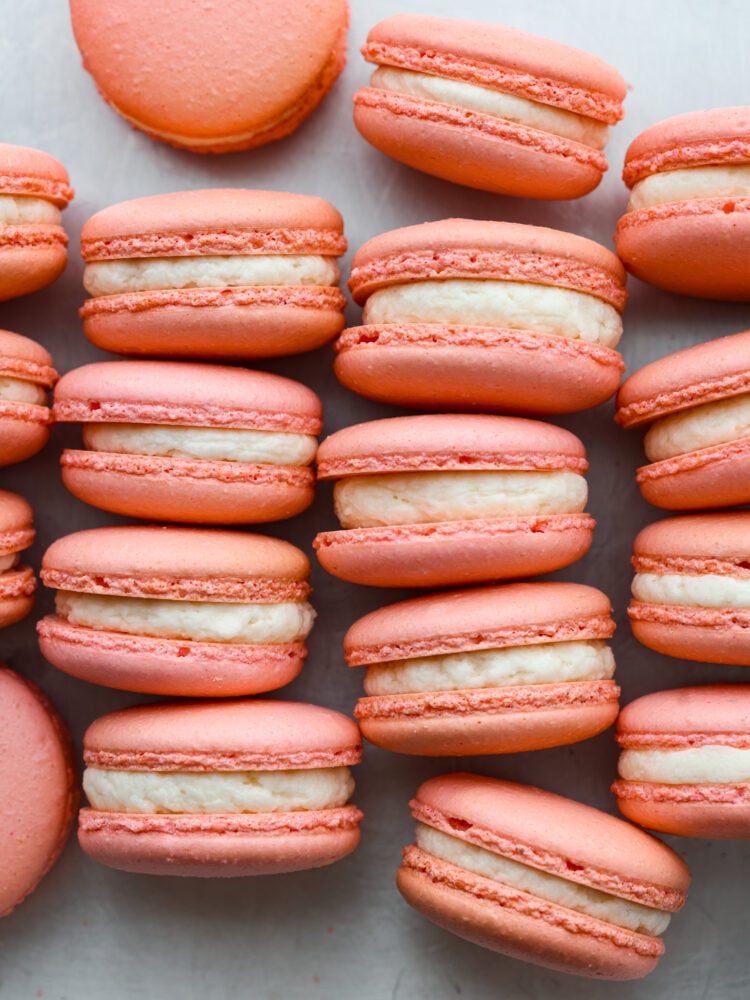
A macaron is a delicious French sandwich cookie with a meringue and almond flour base. It has a really subtle sweet almond flavor and is seriously addicting! I couldn’t stop eating these when I went to France and knew I needed to come back and perfect the recipe. The most important thing to get these cookies right is to follow the recipe exactly and to really pay attention to the details! It isn’t hard, but you do have to get a few things right for this cookie to turn out.
You want the cookie to puff up and leave a foot around the bottom, which looks like a little ruffle around the edges. This is the best way to tell right off the bat if your cookie worked. They should rise up evenly and have a nice smooth top. You will need to use egg whites, and no egg yolks in this recipe. I love to make creme brulee with the leftover yolks! You fill these sandwich cookies with anything you want! I like to do a mousse or white chocolate buttercream. If you want to add a jam in the center, you can pipe a ring of something a little stiffer around the outside of the shell (leaving a space in the middle for jam) and add your favorite jam (mine is strawberry jam). When you close your cookie it is a delicious flavorful surprise in the inside!
Ingredients
You will want to get out your kitchen scale for these French macarons! They are not hard to make, they just take a lot of attention to detail. Measuring in cups won’t be as accurate as measuring by grams. So grab your kitchen scale and lets get baking!
- Granulated Sugar: This is your regular pantry sugar. This is added to the egg whites to help make the meringue.
- Egg Whites: You will want to separate your egg whites from your yolks. Make sure absolutely NO yolk gets into your whites or it will not whip up the right way.
- Almond Flour: Yes, you will need almond flour! This is the traditional flour, and it also makes this cookie gluten-free. So yay for all our gluten-free friends, this is a tasty treat just for you!
- Powdered Sugar: This adds extra sweetness, and also helps you get that nice crispy shell on the outside. Trust me, you DO need to use both powdered and granulated sugar in this recipe.
- Filling of Choice: I talk more about what filling options you have in the tip box below, as well as share some of my suggested recipes.
- Gel Food Coloring: This is optional. The macarons will be a cream color if you don’t add coloring. I think they look so fun with a little color! Don’t use liquid coloring, only use gel or powder. Any additional liquid can throw off the consistency of the cookies.
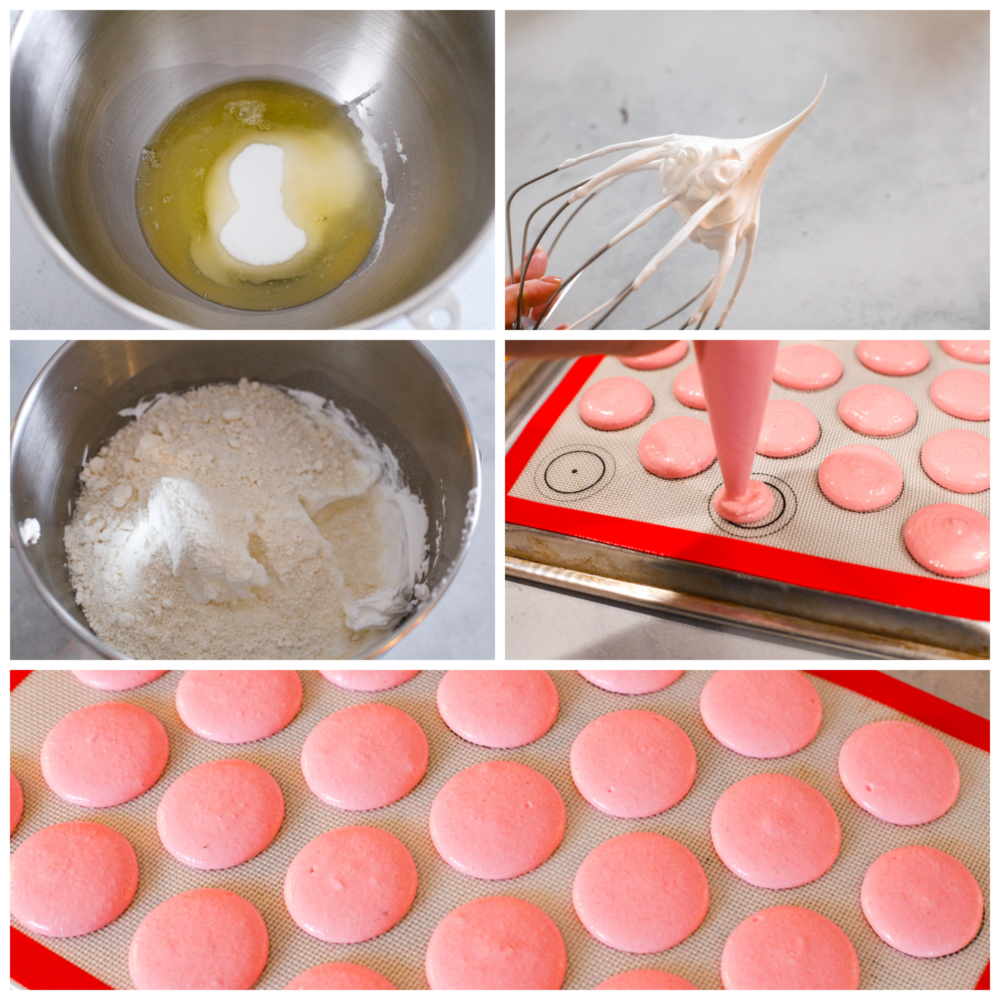
How to Make Macarons
Ok let’s talk about macarons. First off, I want you to stop thinking they are a hard cookie to make! We’ve all seen those baking shows on TV where a lot of people mess up their macarons, but don’t forget that KIDS can also make these cookies and do it perfectly! That’s because all you have to do is pay attention to the details and there are no cutting corners. These cookies have to be made a certain way, and if you do that they will be perfect. So find your courage and lets get to it.
Make the Batter
- Prep: Prep the baking sheets by lining them with silicone baking mats, ideally the ones with the macaron templates on them. If you don’t have the template mats, use the provided template placed under the silicone mats.
- Simmer Water: Bring one inch of water to a simmer in a small pot.
- Clean Bowl and Make Meringue: Wipe the bowl of a stand mixer clean with white vinegar and add the egg whites and granulated sugar. Whisk to combine. Place the bowl over the simmering water being sure the bowl does not touch the water. Whisk until the sugar has dissolved and the mixture is frothy, about 2-3 minutes.
- Whip Meringue: Transfer the bowl to the stand mixer fitted with the whisk attachment. Whip on high speed until glossy, stiff peaks form and the bowl is cooled to room temperature.
- Sift Flour and Sugar: While the egg whites whip, sift the almond flour and powdered sugar twice through a fine mesh sieve.
- Add Flour to Meringue: Add the almond flour mixture to the whipped egg whites and fold, pressing against the side of the bowl as you go. The batter should flow like lava off the spatula in a steady line without breaks and should be able to make a figure 8 without any breaks. The batter should melt back into itself after 10-15 seconds. If it does not and instead just sits on top of the batter beneath it, fold a few more times and try the figure 8 again.
Adding Food Coloring
You can add food coloring to your meringue to make your cookies colorful and more beautiful. Be sure to not overmix your batter by adding your gel or powder food coloring to the meringue once it has finished whipping. You will only need to mix the meringue a little bit longer to get the food coloring incorporated.
Pipe and Rest
- Pipe: Add the batter to a piping bag, taking care to not overfill the bag. Half to two-thirds full is plenty. Snip off the end of the bag, leaving about a quarter inch hole. Pipe the macarons at a 90 degree angle, making a slight swirl motion after you stop piping to prevent dimples.
- Get Air Bubbles Out: Tap the pan firmly on the counter 3-4 times to help remove any air bubbles. You can use a toothpick to pop bubbles that come to the surface but do not pop on their own.
- Rest: Let the macarons rest for 30-60 minutes, until a skin forms on the outside and they do not stick when you lightly touch them.
Bake and Assemble
- Preheat Oven: While the macarons rest, preheat the oven to 300 degrees fahrenheit. When the macarons are ready, bake for 15-18 minutes.
- Test Doneness: To test if the macarons are ready, touch the top of one. It should not jiggle or move around at all, and the top should feel firm. You can gently peel it off the parchment or silicone mat. A macaron that is done will peel off with an in-tact bottom whereas a macaron that needs more time will stick and leave the bottom behind.
- Let Cool and Fill: Once done baking, remove the macarons from the oven and let them cool on the tray. Once cooled, pipe your chosen filling in the center of one shell and gently top with a second shell.
- Mature: If you would like the macarons to develop deeper flavor, fill them and store them in an airtight container in the fridge overnight. This process is called maturing and will allow the shells to absorb the flavor of the filling and the shells to soften slightly.
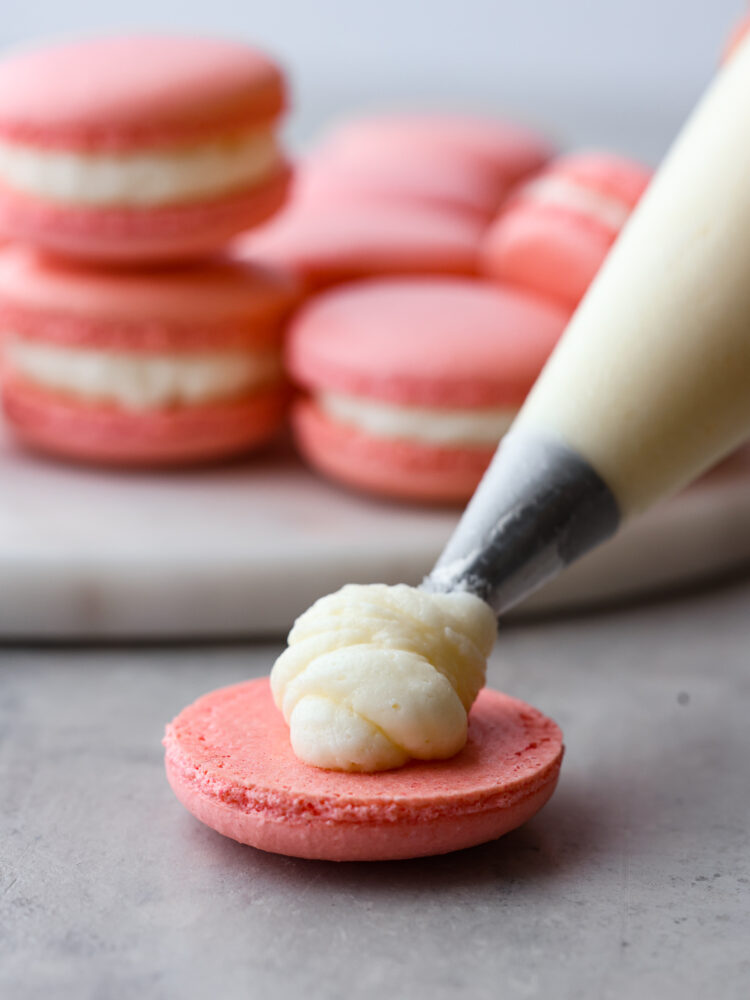
Macarons vs. Macaroons
What’s the difference? You might have heard them pronounced the same way, and maybe assumed they were the same thing! A macaron (mack-ah-ROHN) is what we are making here. It is a delicious French meringue-based sandwich cookie that are usually colorful and filled with many different kinds of filling. A macaroon (mack-ah-ROON) is actually an entirely different cookie! It is a sweetened flaked coconut cookie with almond flour. They both use stiff whipped egg whites and are a light and flavorful cookie, but look and taste totally different! So next time someone talks about these cookies, you’ll know exactly which is which.
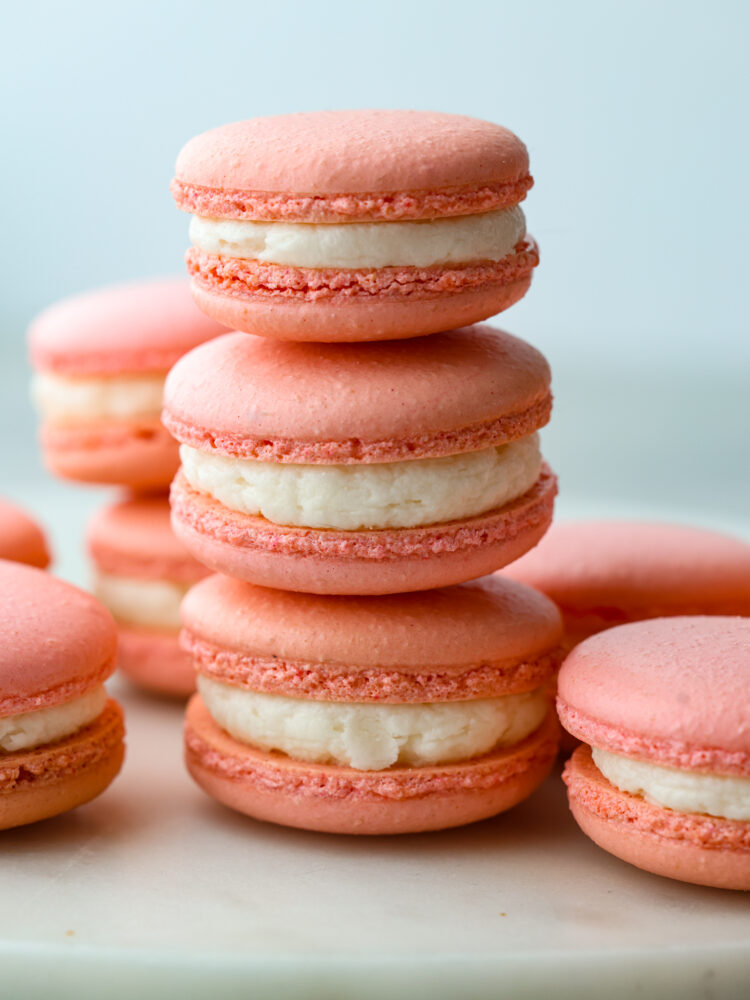
Tips for Making Macarons
You may think that macarons are too hard to make, but with these simple tips you will have success every time! It’s all in the details, so make sure to follow each step and to take your time while making them.
- Age Egg Whites: separate the egg yolks from the egg whites days before making your macarons. Take care to not get any yolk in the whites. Cover the whites with plastic wrap, poke a few holes and leave them in the fridge for 24 hours, or up to 4 days. This allows the proteins in the egg whites to relax and will allow them to whip up easier.
- Clean Your Tools: Use vinegar or lemon juice to wipe down your bowl and whisk before making your meringue. This will eliminate any residual fat on them that might otherwise prevent your meringue from whipping up properly.
- Form a Skin: Let the macarons sit for at least 30 minutes before putting them in the oven. This allows them to form a skin, which prevents air from escaping through the top and leaving you with cracked cookies.
- Baking: If they don’t seem to be baked enough, try turning the temperature down to 275 degrees fahrenheit. Bake for 2-3 minutes at a time before testing the macarons again.
- Leave Overnight: Maturing will really help your macarons absorb flavor. Plan to let them mature at least overnight, if not a full 24 hours before serving.
- Fillings: Fill with ganache, buttercream, mousse, or jam! The shell is a light almond flavor and will absorb the flavor of whatever filling you choose. I prefer to make a coconut mousse, or a chocolate mousse for the chocolate lovers! You can never go wrong with a simple chocolate buttercream frosting.
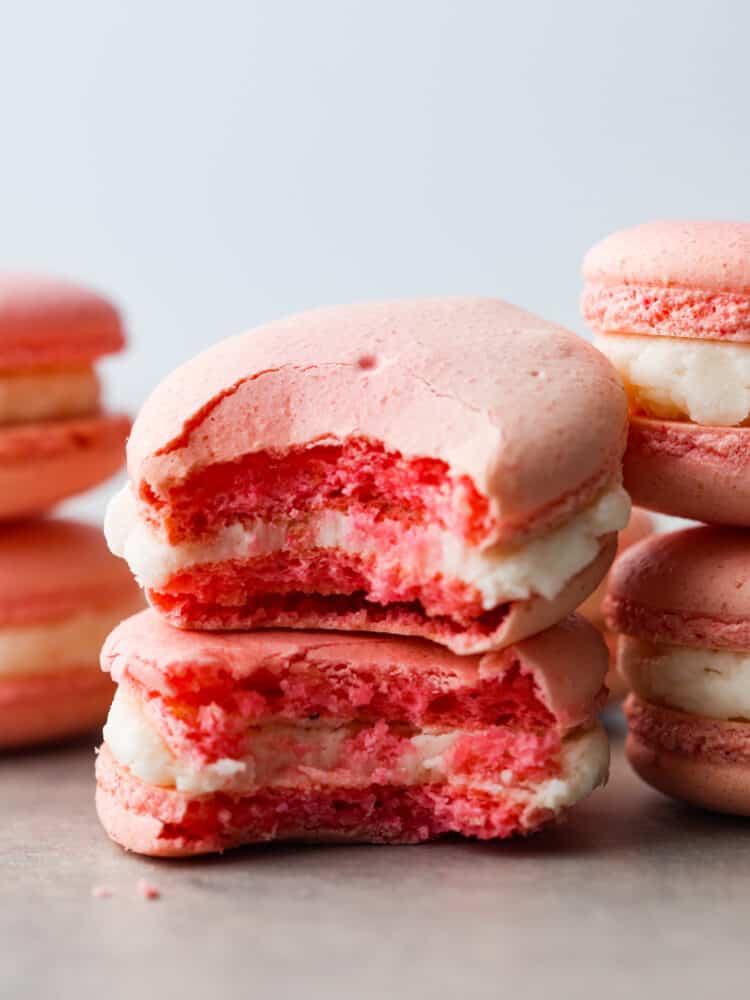
Storing Leftovers
Macarons are a beautiful sandwich cookie that are best eaten 24 hours after they are made. There is something about letting them sit and mature that really brings out the flavor. They don’t last long after that, but luckily you can freeze them if you need to make a lot for a special event! Here is how to store your leftovers.
- Unfilled Macaron Shells: These can be stored in the freezer for up to 3 months in an airtight container. I would make the filling once you are ready to assemble the cookies.
- Filled Macarons: Store in the fridge for up to 3 days in an airtight container.
- 150 grams granulated sugar
- 150 grams egg whites
- 150 grams almond flour
- 150 grams powdered sugar
- Filling of choice see tips for suggestions
- Gel food coloring, optional
Prep the baking sheets by lining them with silicone baking mats, ideally the ones with the macaron templates on them. If you don’t have the template mats, use the provided template placed under the silicone mats.
Bring one inch of water to a simmer in a small pot.
Wipe the bowl of a stand mixer clean with white vinegar and add the egg whites and granulated sugar. Whisk to combine. Place the bowl over the simmering water being sure the bowl does not touch the water. Whisk until the sugar has dissolved and the mixture is frothy, about 2-3 minutes.
Transfer the bowl to the stand mixer fitted with the whisk attachment. Whip on high speed until glossy, stiff peaks form and the bowl is cooled to room temperature.
While the egg whites whip, sift the almond flour and powdered sugar twice through a fine mesh sieve.
Add the almond flour mixture to the whipped egg whites and fold, pressing against the side of the bowl as you go. The batter should flow like lava off the spatula in a steady line without breaks and should be able to make a figure 8 without any breaks. The batter should melt back into itself after 10-15 seconds. If it does not and instead just sits on top of the batter beneath it, fold a few more times and try the figure 8 again.
Add the batter to a piping bag, taking care to not overfill the bag. Half to two-thirds full is plenty. Snip off the end of the bag, leaving about a quarter inch hole. Pipe the macarons at a 90 degree angle, making a slight swirl motion after you stop piping to prevent dimples.
Tap the pan firmly on the counter 3-4 times to help remove any air bubbles. You can use a toothpick to pop bubbles that come to the surface but do not pop on their own.
Let the macarons rest for 30-60 minutes, until a skin forms on the outside and they do not stick when you lightly touch them.
While the macarons rest, preheat the oven to 300 degrees fahrenheit. When the macarons are ready, bake for 15-18 minutes.
To test if the macarons are ready, touch the top of one. It should not jiggle or move around at all, and the top should feel firm. You can gently peel it off the parchment or silicone mat. A macaron that is done will peel off with an in-tact bottom whereas a macaron that needs more time will stick and leave the bottom behind.
Once done baking, remove the macarons from the oven and let them cool on the tray. Once cooled, pipe your chosen filling in the center of one shell and gently top with a second shell.
If you would like the macarons to develop deeper flavor, fill them and store them in an airtight container in the fridge overnight. This process is called maturing and will allow the shells to absorb the flavor of the filling and the shells to soften slightly.
Serves: 24
Calories87kcal (4%)Carbohydrates14g (5%)Protein2g (4%)Fat3g (5%)Saturated Fat0.2g (1%)Sodium11mgPotassium10mgFiber1g (4%)Sugar13g (14%)Calcium14mg (1%)Iron0.2mg (1%)
All nutritional information is based on third party calculations and is only an estimate. Each recipe and nutritional value will vary depending on the brands you use, measuring methods and portion sizes per household.
Course Dessert
Cuisine French
Keyword French macarons, macarons
Alyssa Rivers
I am Alyssa and the blogger behind The Recipe Critic. I started my blog in June of 2012 as a place to share my passion for cooking. I love trying new things and testing them out with my family.

